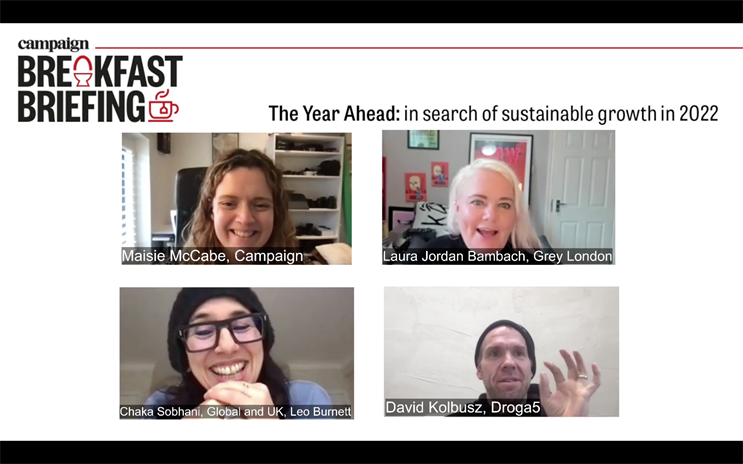
Purpose-led advertising has brands “wrapped up in trying to save the world” and is leading the industry astray, Droga5’s David Kolbusz warned in a panel discussion at ±±¾©Èü³µpk10’s Year Ahead Breakfast Briefing, which took place last week.
For Kolbusz, chief creative officer at Droga5 London, more priority needs to be placed on entertaining consumers. He said: “We're all chasing this precious jewel and we need to get back to stuff that's a little more light and fun.”
He added that the industry is losing an entire skill set due to the importance it places on purpose-led work at awards shows. “It's not that there's a lack of humour. It's just not being celebrated or rewarded,” Kolbusz said.
“[We’re] missing out on large swathes of incredible creativity, because it feels like it's not measuring up to the work that suggests it's fulfilling a higher purpose.”
Kolbusz appeared at ±±¾©Èü³µpk10's Year Ahead conference alongside Laura Jordan Bambach, chief creative officer at Grey London, and Chaka Sobhani, Leo Burnett’s global chief creative officer.
The trio discussed the struggles of finding inspiration at a time of remote working and examined where the creative industry is heading. Concerns were raised over advertising’s motivations and how the industry is forgetting its commercial purpose.
Jordan Bambach said the reason for this push on brand purpose could be due to guilt. “Advertising has had such a bad rap for so long that people are kind of feeling bad about what we're doing,” she said. “I think there’s a collective guilt about what we do, which doesn't help.”
Sobhani suggested there's an embarrassment in adland around its relationship between commerce and creativity.
“But all art is about commerce and creativity,” she said. “Musicians need to sell fucking albums, artists need to sell pieces of work. There's no shame in that.”
She pointed out how this relationship is just more transparent in advertising, which means the industry’s creatives have to “work harder to entertain people and be more engaging”.
This view on the industry appeared in an article penned by Kolbusz for ±±¾©Èü³µpk10 back in 2017, when he wrote: “We have taken our eyes off what actually matters and what clients used to pay us for: wholly exceptional work that wins the hearts and minds of consumers and sells their product or service.”
In another article published early last year, Steve Harrison gave a similar diagnosis to the one put forward by Jordan Bambach during the conference.
Harrison said: “The enemy remains the same: free-market capitalism. It’s cited as the root cause of the problems faced by the ethnic/gender/racial communities we now champion. Add the climate crisis to the charge sheet, and it’s clear why adland no longer wants to stoke the engines of capitalist consumption and growth.”
The panel concluded that it is creatives’ responsibility to determine what the brand’s purpose truly is. According to Sobhani, that "purpose doesn't have to be changing the world" and entertainment is just as valid as education.
“It has to be true to your brand,” she said. “If it's not true to your brand, people sniff bullshit straightaway.”



.jpg)
.jpeg)
